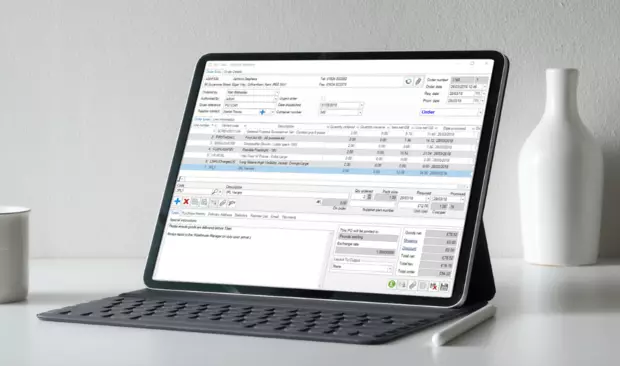
How to mange bulk orders, call offs and inventory drawdown
Explore effective strategies for managing bulk orders, call offs, and inventory drawdowns with Orderwise.

In the modern world of business, efficient procurement processes play a crucial role in maintaining smooth operations. One essential component of the procurement process is the purchase order. In this guide, we will explore what a purchase order is, its significance, and how it businesses can benefit from using a purchase order system.
A purchase order (PO) is a commercial document issued by a buyer to a vendor or supplier. It serves as a formal request to purchase goods or services and outlines the specific details of the transaction. A purchase order typically includes information such as the buyer and vendor details, item descriptions, quantities, prices, delivery dates, and payment terms. It acts as a legally binding agreement between the buyer and the vendor, ensuring clarity and mutual understanding of the transaction.
Purchase orders are essential for several reasons. They establish a clear and documented record of the buyer’s intent to purchase, provide a reference for both parties during the transaction, and serve as a basis for resolving any disputes that may arise. Moreover, purchase orders enable businesses to track and manage their procurement activities efficiently, ensuring accurate inventory management, budget control, and compliance with regulatory requirements.
To ensure comprehensive and accurate purchase orders, several key elements must be included:
Vendor information:
The purchase order should contain complete details of the vendor, including the vendor’s name, address, contact information, and any specific instructions for delivery or invoicing.
Purchase order number:
Each purchase order should have a unique identification number assigned to it. This number helps in referencing and organising purchase orders for easy retrieval and tracking.
Date and delivery details:
The purchase order should clearly mention the date it is issued and the expected delivery date or the agreed-upon timeframe for the goods or services.
Item descriptions, quantities, and prices:
Accurate and detailed descriptions of the items being ordered, including their quantities and agreed-upon prices, are crucial to avoid any confusion or discrepancies.
Terms and conditions:
Purchase orders may include terms and conditions related to payment terms, warranties, shipping instructions, returns policy, and any other specific agreements or requirements agreed upon between the buyer and the vendor.
Utilising purchase orders offers several benefits for businesses:
Streamlined procurement process:
Purchase orders streamline the procurement process by establishing a standardised workflow. They ensure that purchases are authorised, documented, and tracked consistently, reducing the risk of unauthorised purchases or errors.
Improved communication with vendors:
Purchase orders facilitate clear and effective communication between buyers and vendors. They serve as a reference document, ensuring that both parties are aligned on the details of the purchase, reducing miscommunication and potential disputes.
Accurate financial tracking:
By using purchase orders, businesses can accurately track their procurement expenses. Purchase order records enable efficient financial tracking, budget management, and cost analysis, aiding in better financial decision-making.
Enhanced inventory management:
Purchase orders help maintain accurate inventory records. When purchase orders are linked to inventory management systems, businesses can track stock levels, manage reordering efficiently, and avoid stockouts or overstocking.
Dispute resolution and legal protection:
Purchase orders provide legal protection for both buyers and vendors. In case of disputes or discrepancies, purchase orders act as evidence of the agreed-upon terms, ensuring a clear resolution process.
OrderWise, a leading provider of business management software solutions, offers comprehensive features to streamline purchase order management. By implementing purchase order software into your business you can expect to reduce time, money and personal by automating a number of processes including:
Creating purchase orders
Purchase order software allows users to create purchase orders easily. It provides intuitive interfaces for entering vendor details, selecting items, specifying quantities, and defining pricing and terms.
Purchase order processing
OrderWise automates the processing of purchase orders, reducing manual effort and eliminating the risk of errors. The software automatically generates purchase order numbers, calculates totals, and tracks the approval status of orders.
Integrating inventory management
Purchase order software from OrderWise integrates seamlessly with inventory management systems. This integration enables real-time synchronisation of purchase orders with inventory levels, ensuring accurate stock management and efficient order fulfilment.
Streamlining vendor communication
OrderWise software offers features for efficient vendor communication. Users can generate and send purchase orders electronically, track order statuses, and receive notifications on order acknowledgments, shipments, and invoicing.
To maximise the benefits of purchase orders, businesses should follow these best practices:
Purchase orders are fundamental to efficient procurement processes, ensuring clarity, accuracy, and legal protection for both buyers and vendors. By utilising comprehensive purchase order management software from Orderwise, businesses can streamline their purchase order management, enhance communication with vendors, and achieve better control over their procurement activities.
Implementing best practices and leveraging technology can significantly contribute to optimising the purchase order process and ultimately contribute to the overall success of the business.
Remember, OrderWise offers a wide range of software solutions that cater to various business needs, including purchase order management - find out more here.